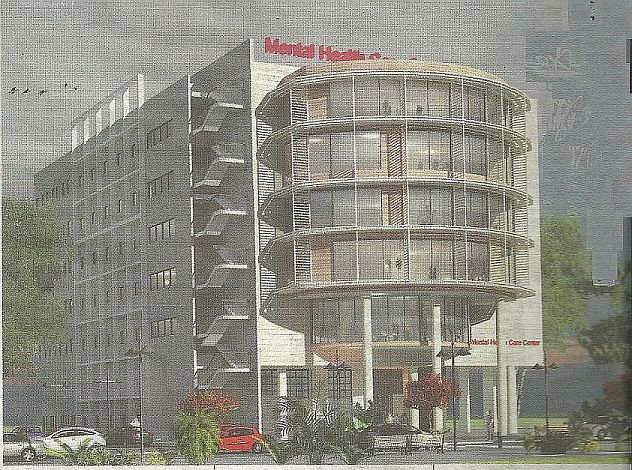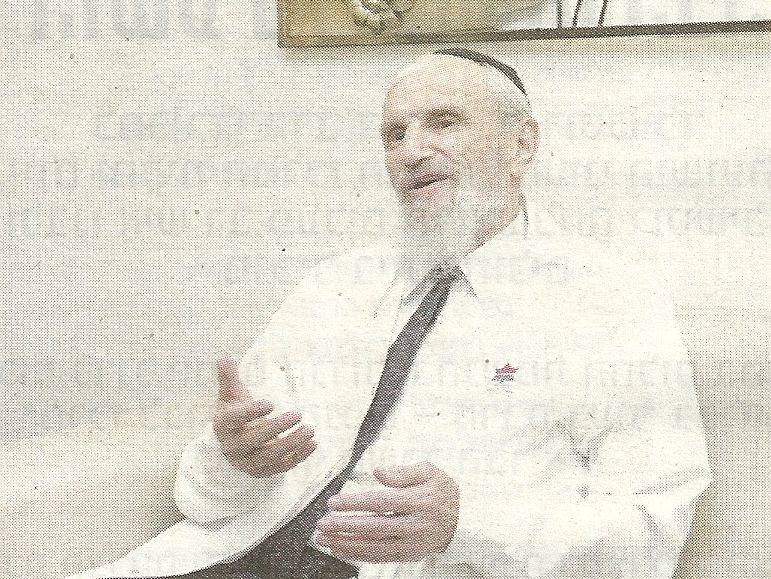 This coming Sunday, the 21st of Iyar, will herald a milestone for the chareidi public. 25 years after the establishment of the Maayonei Hayeshua Medical Center in Bnei Brak, which has since become a symbol and hallmark for medical professionalism according to the spirit and practical application of Halacha, serving hundreds of thousands of patients a year, including bringing into the world over a thousand of new infants a month from all over the country (i.e. forty births daily!), the dedication of the first hospital of its kind in the entire world will open its doors to the public.
This coming Sunday, the 21st of Iyar, will herald a milestone for the chareidi public. 25 years after the establishment of the Maayonei Hayeshua Medical Center in Bnei Brak, which has since become a symbol and hallmark for medical professionalism according to the spirit and practical application of Halacha, serving hundreds of thousands of patients a year, including bringing into the world over a thousand of new infants a month from all over the country (i.e. forty births daily!), the dedication of the first hospital of its kind in the entire world will open its doors to the public.
It will encompass 12.5 thousand square meters (125 thousand square feet), and will treat every facet of the broad spectrum of the various mental ills which, to our regret, have become increasingly prevalent in our society. Seven floors excellently designed both externally and internally by top experts and guided by Torah leaders will serve the various sectors of the population on different floors for men, women and children. Five years ago the cornerstone was laid, followed by energetic and painstaking activity to beat the ticking clock of time, and now this magnificent edifice stands completed, featuring two floors for hospitalized patients, a floor for day clinic and an entrance lobby, awaiting the inauguration ceremony. This new complex will bear the name "Marbeh Daas", conferred by HaRav Chaim Kanievsky.
HaRav Moshe Rothschild, the indomitable and incredible initiator and current president of the hospital, invites the press to his office and with shining eyes, points to a black and white photo of the old original building which served as the Jewish hospital in Posen, Poland, and reveals, "HaRav Akiva Eiger, who stood behind the establishment of that hospital and served as its active director general, is the model which excited and motivated me. I emigrated from Switzerland forty years ago and as a doctor, had the opportunity to help many, many Jews. I treated dozens of patients each Shabbos. The numbers sometimes passed the hundred mark. I also served as the private physician of many gedolim, including the Steipler and the Baba Sali.
"When I set out to build a hospital in Bnei Brak, many discouraged me and said that building a hospital was an impossible project. But my obsession proved itself and the Beis Harefua [not a hospital but a `Home for Healing'] in Bnei Brak came into being and has been operating for the past twenty-five years. It is a symbol of success which even the whole health industry which cast aspersion upon my vision now acknowledges and cooperates fully with it today. Today we stand before the next stage which is unprecedented in the entire world, which no one believed would overcome the high barriers confronting its establishment. This new hospital will offer a beam of light to those suffering in one of the most neglected areas of medicine known as psychiatry."
Rabbi Rothschild closes his eyes and his voice turns sharp and pained as he describes the situation: "Mentally ill patients suffer from stigma and prejudice, causing them to feel sometimes akin to lepers. Suffice it that some second cousin suffer from some mental disease to disqualify any potential shidduch, besides which society at large causes those afflicted to feel far worse than their condition warrants. The public lacks the realization that the One Who created physical ailments also created mental diseases which also require the desecration of Shabbos in order to save the victims in the very same way that Halacha requires the physical saving of lives. The center which we have built will provide an address for those sufferers with an honorable recognition and treatment tandem with the Halacha, for conditions which are often downtrodden in other medical establishments and often as well, through a negative approach, cause much irreversible damage to the patients."
With fervent enthusiasm belying his advanced age, he describes what brought him to embark upon this impossible project, so filled with exhausting stumbling blocks even to this day, and why this impressive and huge edifice will in no time be filled beyond capacity.
"I am faced with patients who have nowhere to turn, and to our distress, today there are virtually no homes without someone with a mental problem, though the trend is to suppress the fact and not treat the illness out of embarrassment."
Isn't this somewhat exaggerated? From where have all of these mental diseases suddenly surfaced?
"It is a heavenly decree connected to the so-called rat race of modern society which is replete with stress and rush in daily life. In the past decade, ever since society has begun recognizing and treating mental problems, we have treated over twenty-two thousand patients in the existing hospital, some of which need ongoing supportive care to this day. A notable percentage of the population suffers from epilepsy. 10% of mothers suffer from postpartum depression and so on. Hundreds of thousands of people beg for help and treatment and the public is not even aware of the scope of problems extant in all of the educational institutions, from elementary school up to yeshivos and seminaries. Sometimes an emotional insult from the surrounding society or from a staff member can result in a massive emotional reaction with heavy repercussions for future years. This is an area which is not addressed for lack of an address, with no institution in the world answering to the demands of Halacha for a chareidi Jew."
"In addition to the high level of medicine of high ranking doctors which we mobilized for the center, the treatment is administered with the full backing of a halachic committee (HaRav Chaim Kanievsky; HaRav Yitzchok Zilberstein who serves as the chairman of the halachic committee; HaRav Moshe Shaul Klein; HaRav Sariel Rosenberg), abiding by the Torah outlook, and I will be meticulous in seeing that all the medical staff be shomer mitzvos. A secular doctor who has not yet become a baal teshuva will hardly find a foothold by us since many mental diseases revolve around religious issues, like OCD where the sufferers are convinced that they are lax in mitzvah observance and develop obsessive behavior patterns. This is why the viewpoint of the doctor, including the staff working with him, is critical to the patient's treatment. Our center will maintain total separation through different floors for men and women, both in the outpatient clinics and the hospitalization itself, without easy access from one to the other both on premises and on the balconies."
 95% of Mental Illnesses can be Treated
95% of Mental Illnesses can be Treated
"After fifty years of medicine, I can say clearly that the biggest revolution in medicine is in psychiatry and the treatment available in this field for mental sufferers," Dr. Rothschild declares movingly. "Thirty years ago, schizophrenic patients and others had to be hospitalized to the end of their days. Today, medicine can help them in every possible way. The good news is that all of these sufferers can be helped (personally, I refrain from hospitalizing chronic sufferers, but focus on short term hospitalization xxxshelo yitztarchu pkak chosem). In our center where life itself is the uppermost value for which we battle for every person at every age and every stage, with the clear knowledge that all emanates from Hashem, Who doles out the destiny of each person, we fight for quality of life for each person without despairing of any single case."
"In some mental health cases the cure is complete, but some require extended treatment. But the good news is that there is 90 percent success in the treatment, or even better. This means improving the situation to the extent that everyone can reach functionality and independence in their lives.
Which types of treatment do you offer?
"Each cases is evaluated on its own. It depends on who is sick, what he or she is suffering from and for how long. Not everyone is cured and not every medicine is successful. One has to daven to fund the proper doctor. I can say that we have found that the most important medicine in our house of healing, which has been proven to be effective, is SD: Siyata DeShmaya.
"I want to emphasize: There is a treatment for 95% of mental illness. But absurdly often the question is not if there is a medicine for the ailment, but if the patient is willing to take it. Many of the patients are worried about the social stigma, and there is a fear of being branded as one of the mentally ill. But even after they have overcome the initial barriers and have come for a diagnosis they often refuse to take the medicine, for various reasons. It sometimes requires creative thinking to get them to cooperate."
"The pressures of life and difficulties in parnossoh cause most of the illness and problems," says Dr Rothschild. "Everone is too busy. There is not enough time and people do not always know how to tell what is important and what is not. The result is that there is not enough attention to the children themselves. The best advice is to give them more attention. To worry about the nefesh as much as the body. To smile, to greet warmly. Often when we find problems with a child I advise the father to take a day off and go for a trip. I cannot describe what kind of change this often brings - just spending time together.
"When there is a problem it is important not to deal with it on one's own or even with friends. It is important to seek the advice of experts, certified and experienced. There are many nature shops and people without and knowledge of psychiatry who claim to heal. But there are many rabbonim with real understanding and experience in psychiatric problems. I also advise not to put off treatment. People often come to us too late. The earlier problems are dealt with, the better the results."

Dr Rabbi Moshe Rothschild




